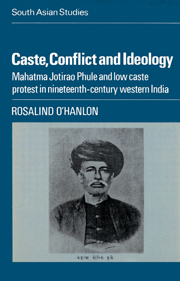 Caste, Conflict and Ideology
Caste, Conflict and Ideology Book contents
- Frontmatter
- Contents
- Acknowledgements
- Notes on translations and area under study, with map
- Part 1 Introduction
- Part 2 Religion and society under early British rule
- Part 3 Jotirao Phule and his circle: the emergence of a distinctive radical voice
- Part 4 The creation of a lower caste identity in history and popular culture, 1869–73
- Part 5 The lower caste community in contemporary society
- 11 Religious emancipation and political competition
- 12 Social protest and the construction of a religious ethic
- 13 Traditional privileges and new skills: Phule's analysis of the nature of Brahman power
- 14 The Satyashodhak Samaj in the 1870s
- Part 6 Ideology and the non-Brahman movement in the 1880s
- Bibliographic note
- Bibliography
- Glossary
- Index
14 - The Satyashodhak Samaj in the 1870s
from Part 5 - The lower caste community in contemporary society
Published online by Cambridge University Press: 14 October 2009
- Frontmatter
- Contents
- Acknowledgements
- Notes on translations and area under study, with map
- Part 1 Introduction
- Part 2 Religion and society under early British rule
- Part 3 Jotirao Phule and his circle: the emergence of a distinctive radical voice
- Part 4 The creation of a lower caste identity in history and popular culture, 1869–73
- Part 5 The lower caste community in contemporary society
- 11 Religious emancipation and political competition
- 12 Social protest and the construction of a religious ethic
- 13 Traditional privileges and new skills: Phule's analysis of the nature of Brahman power
- 14 The Satyashodhak Samaj in the 1870s
- Part 6 Ideology and the non-Brahman movement in the 1880s
- Bibliographic note
- Bibliography
- Glossary
- Index
Summary
Introduction
So far, we have reconstructed the main features of Phule's ideas between 1855 and 1873. In this chapter, we will begin to look at the role that these ideas were to play from 1873, the year in which Phule, his friends, caste-fellows, and business colleagues founded the Satyashodhak Samaj, the ‘Truth-Seeking Society’. We will examine the origins of this society, both in the joint organisational efforts of Phule and his circle, and in the broader intellectual and religious milieu of Pune in the 1870s. We will look also at its ideological orientation and the membership that it attracted in the early years of its existence.
The Satyashodhak Samaj was only the first of many efforts of organisation that were to be made by lower caste politicians and ideologues in the last three decades of the century. Different leaders produced their own analyses of the plight of the lower castes, and concentrated on varying areas of organisation and propaganda. Yet they all worked within the same broad set of assumptions about Maharashtra's history and the divisions in her present-day society. These assumptions were of a fundamental division within Maharashtrian society. On one side lay the vast majority of her population, who lived and laboured on the land, who provided for the material support of all other groups, yet who lived in poverty and ignorance. On the other were the small groups of Brahmans and other literate castes, who had added to their existing religious authority a virtual monopoly of English education and of clerical and professional employment in the British administration.
- Type
- Chapter
- Information
- Caste, Conflict and IdeologyMahatma Jotirao Phule and Low Caste Protest in Nineteenth-Century Western India, pp. 220 - 252Publisher: Cambridge University PressPrint publication year: 1985


